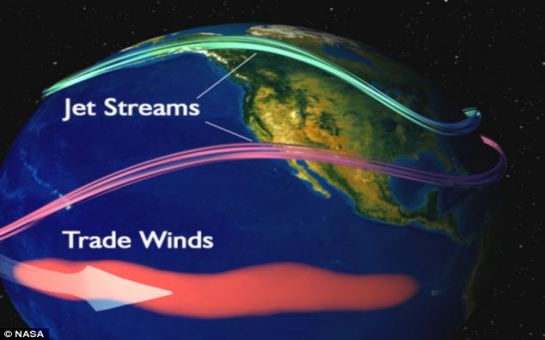Scientists believe there is a 75 per cent chance that 2014 will be the hottest on record.That’s because the menacing El Niño weather pattern seems to be ready to blow huge amounts of heat into the atmosphere.An El Niño occurs when equatorial Pacific waters are unusually warm. It can change ocean and wind currents across the globe, wreaking havoc on the climate.Scientists in Germany now believe they can forecast disruptive El Niño events a year in advance, according to a study in PNAS.They hope the forecast could allow countries to develop better strategies that can counter the devastating effects of an El Niño event.Scientists commonly forecast El Niño, which means ‘little boy’ in Spanish, about six months in advance, but long-term predictions have so far been tricky.Up until now, scientists have forecast the event by analysing water temperatures in the eastern Pacific, along the equator.But because water temperature is strongly influenced by the winds blowing across the equator, predictions have been limited to six months or less.Instead of analysing the water temperature in a specific area of the Pacific Ocean, Armin Bunde of Justus Liebig University in Giessen, Germany, and his colleagues looked at the atmospheric temperatures in all areas of the Pacific.They then looks at how the temperatures in the El Niño basin are linked to the temperatures in the rest of the Pacific area.The researchers claim their method correctly predicted the absence of El Niño events over the past two years, and forecast about a 75 per cent chance of an El Niño in late 2014.Climatologist Tim Barnett at the Scripps Institution of Oceanography in La Jolla, told LiveScience that the methods the researchers employed were outdated.‘The techniques the researchers used made me feel like I was back in the 1980s and 1990s,’ Mr Barnett said in an interview.Others argue that this approach does not look at the physics of the seas or atmosphere, but only looked for statistical patterns in temperature – which they claim can always be found if you look hard enough.‘The risk of an El Nino event in the second half of 2014 has increased, but it's certainly not guaranteed at this point in time,’ said Andrew Watkins, Supervisor, Climate Prediction at Australia's Bureau of Meteorology.Mr Watkins said early indications suggested that the weather pattern could arrive as early as June, though the prospect would not become clear until the second quarter.Last month, a separate study found that extreme weather events fuelled by unusually strong El Niños are expected to double.Climate scientists warned that countries could be struck by devastating droughts, wild fires and dramatic foods approximately every ten years.An international team of scientists from the ARC Centre of Excellence for Climate System Science (CoECSS), the U.S. National Oceanic and Atmospheric Administration and CSIRO, has spotted a link between global warming and extreme El Niño events.‘We currently experience an unusually strong El Niño event every 20 years. Our research shows this will double to one event every 10 years,’ said Agus Santoso of CoECSS, who co-authored the study.(dailymail.co.uk)ANN.Az
Could 2014 be the hottest on record?
Society
13:15 | 12.02.2014

Could 2014 be the hottest on record?
You might need to dig out those sunglasses earlier than expected this year.
Follow us !










